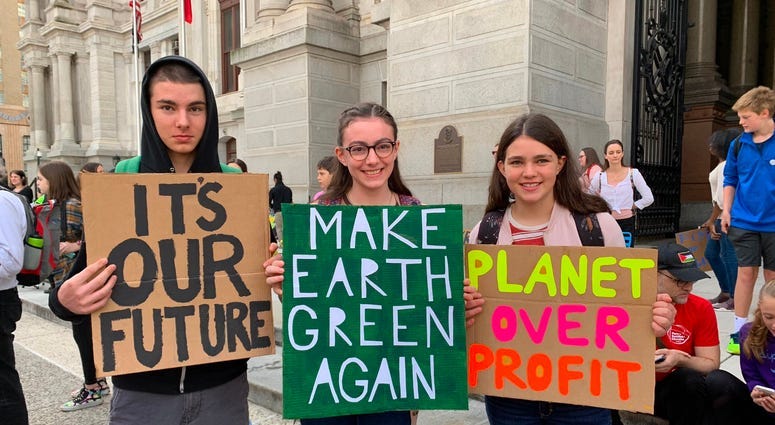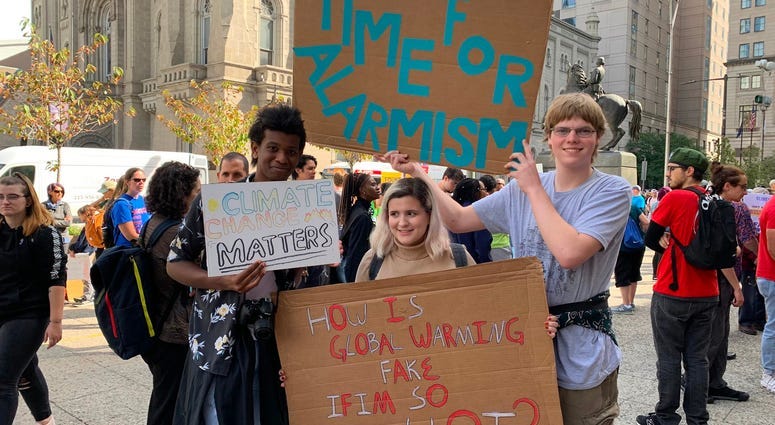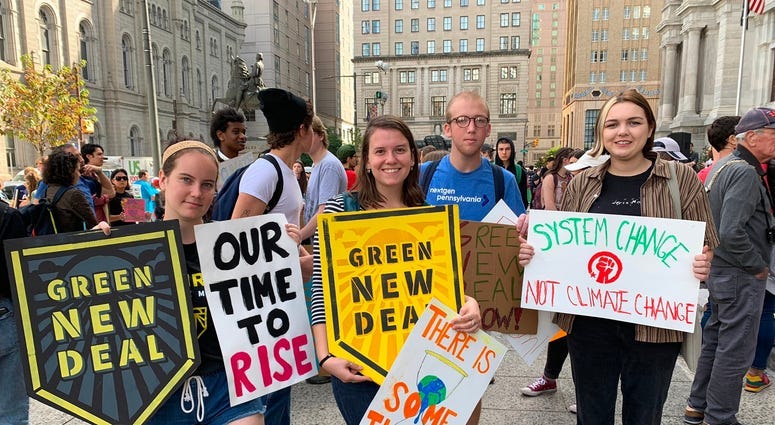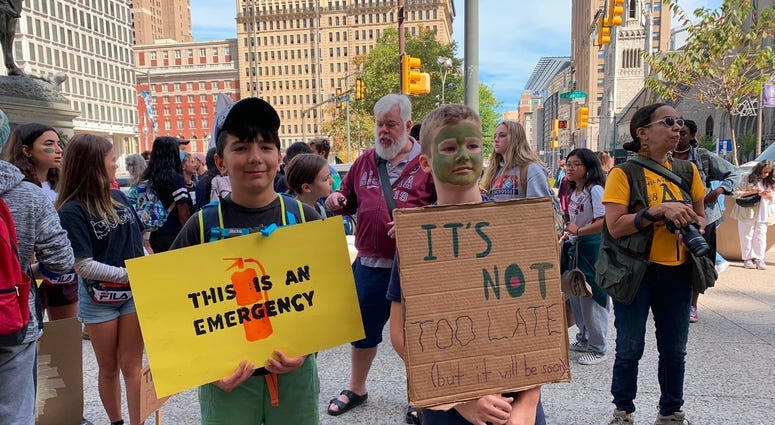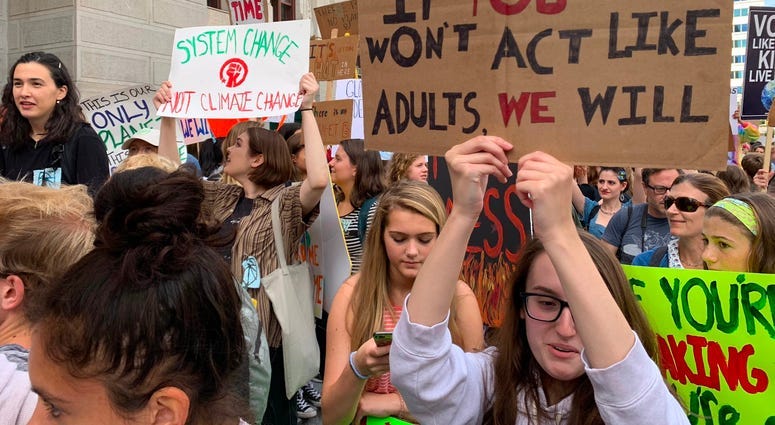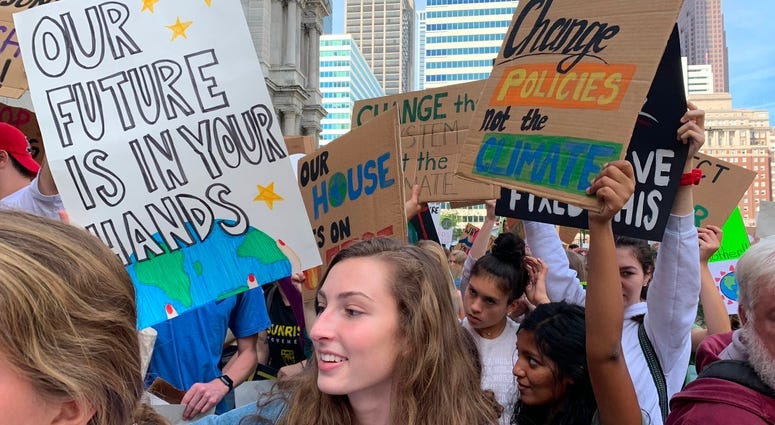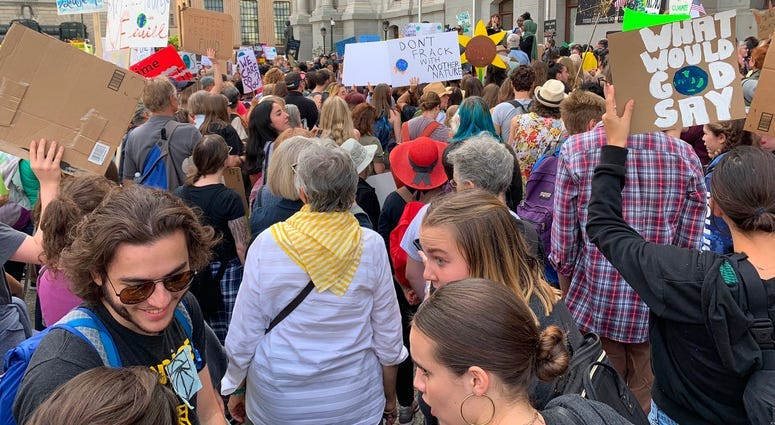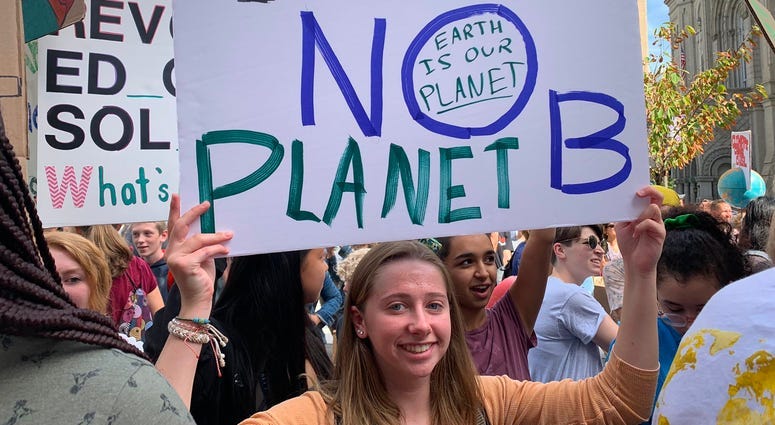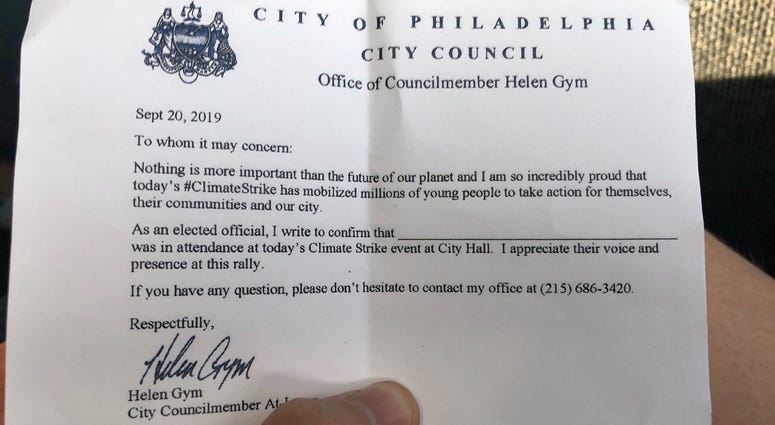Philly-area students join global wave of climate change protests
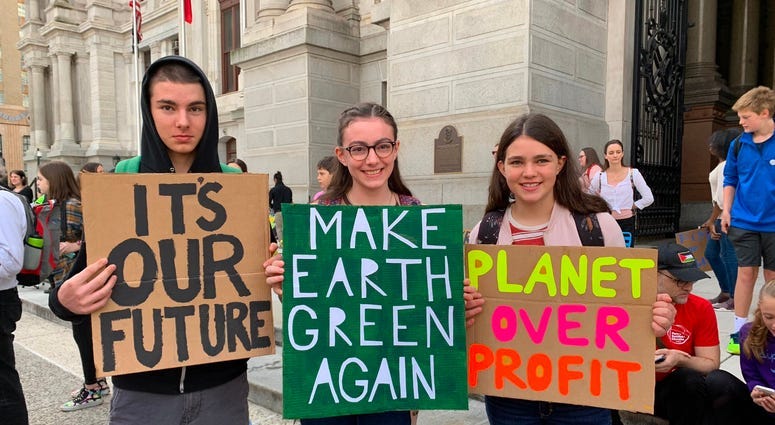
PHILADELPHIA (KYW Newsradio) — Thousands of Philadelphia and Philadelphia-area students skipped school Friday to gather at City Hall in solidarity with a global Climate Strike of young people all around the world.
Atara Saunders, 17, of Cheltenham High School explained why so many young people showed up.
"We are the ones who are scared to have kids because we won't know what kind of life is there for them. We are the ones who've been failed by the adults in power, so we feel that in order to protect our future, we don't have a choice. We have to strike," Saunders said.
They say there are a lot of issues that need to be addressed right now when it comes to cleaning up the Earth.
"I'm here because this is our only planet," said Phoenix Wix, 13, a student at the Waldorf School. "But I have to say, the greenhouse gases scares me the most, because people are saying that it might be irreversible in, like, a decade or two."
"If humans go extinct, the world will thrive, but if bees go extinct, our world is done," said Eden Saunders, 14, of Cheltenham High School. "Like, the world will thrive when we're not here, and the world needs to thrive when we are here."
When asked what is the most pressing environmental issue today, Koby Fallon, 12, of Green Street Friends School, said, "I think that it's factories, big factories, releasing tons of CO2 into the air."
But the students say the powers that be don't need to listen to them — they should listen to the scientists.
"I want the government to acknowledge that climate change is actually happening, and they need to do something about it before it's irreversible," said Camille Edelson, 14, of Cheltenham High School.
Asked if it's strange that need to tell the government to listen to science, Edelson said, "It's sad. It's not strange."
Above all, said the students, the world can't wait for action.
"If it keeps on happening like this, the world, some of it could become uninhabitable," said Fallon. "The sea level's rising. There's a few coasts where it's gonna be underwater.
Many of the students recognize that nobody with power or money is going to give up that power or money to help the causes that impact people without a voice.
Paige Scott-Cooper, 17, of the Girard Academic Music Program, said she considers it a matter of personal responsbility.
"We are the future," Scott-Cooper said. "No one else is going to speak up about it. That's our responsibility."
The Philadelphia School District said Friday that students attending the climate strike will be marked absent — unlike New York City which is allowing students to attend the rallies today.
American demonstrations were part of a wave of climate change protests sweeping across the globe, from Canberra to Kabul and Cape Town to Copenhagen. Hundreds of thousands of young people rallied to send a message to leaders headed for a U.N. summit.
The Global Climate Strike" events ranged from a gathering of about two dozen activists in Seoul using LED flashlights to send Morse code messages calling for action to rescue the earth to demonstrations around Australia that organizers estimated were the country's largest protests since the Iraq War in 2003.
The protests were partly inspired by the activism of Swedish teenager Greta Thunberg, who has staged weekly demonstrations under the heading "Fridays for Future" over the past year, calling on world leaders to step up their efforts against climate change.
"It's such a victory," Thunberg said in an interview Friday with The Associated Press in New York. "I would never have predicted or believed that this was going to happen, and so fast — and only in 15 months."
Thunberg is expected to participate in a U.N. Youth Climate Summit on Saturday and speak at the U.N. Climate Action Summit with global leaders on Monday.
"They have this opportunity to do something, and they should take that," she said in the interview. "And otherwise, they should feel ashamed."
The world has warmed about 1 degree Celsius (1.8 Fahrenheit) since before the Industrial Revolution, and scientists have attributed more than 90 percent of the increase to emissions of heat-trapping gases from fuel-burning and other human activity.
Scientists have warned that global warming will subject Earth to rising seas and more heat waves, droughts, powerful storms, flooding and other problems, and that some have already started manifesting themselves.
Nations around the world agreed at a 2015 summit in Paris to hold warming to less than 2 degrees Celsius (3.6 Fahrenheit) more than pre-industrial-era levels by the end of this century.
However, U.S. President Donald Trump subsequently announced that he was withdrawing the U.S. from the agreement, which he said benefited other nations at the expense of American businesses and taxpayers.
Trump referred to global warming as a "hoax" before becoming president. He has since said he's "not denying climate change" but is not convinced it's manmade or permanent.
The U.N. summit is aimed at eliciting concrete proposals from various countries to make progress toward the Paris goal.
Friday's demonstrations started in Australia, where organizers estimated 300,000 protesters marched in 110 towns and cities, including Sydney and the national capital, Canberra. Demonstrators called for their country, the world's largest exporter of coal and liquid natural gas, to take more drastic action to reduce greenhouse gas emissions.
Hundreds of rallies took place across Europe, including in the Czech Republic, Germany, Britain and Poland, which is still widely coal-reliant and where many middle schools gave students the day off to enable them to participate in the rallies in Warsaw and other cities.
In Berlin, police said more than 100,000 people gathered in front of the capital's landmark Brandenburg Gate, not far from Chancellor Angela Merkel's, office where the Cabinet thrashed out the final details of a 54 billion euro ($60 billion) plan to curb Germany's greenhouse gas emissions .
Thousands of schoolchildren and their adult supporters demonstrated in London outside the British Parliament, some holding home-made placards with slogans including "Don't be a fossil fool" and "Make our planet Greta again," in a reference Thunberg.
The British government said it endorsed the protesters' message but didn't condone skipping school — a stance that didn't sit well with some of the young protesters.
"If politicians were taking the appropriate action we need and had been taking this action a long time ago when it was recognized the world was changing in a negative way, then I would not have to be skipping school," said Jessica Ahmed, a 16-year-old London student.
In Helsinki, the Finnish capital, a man dressed as Santa Claus stood outside parliament holding a sign: "My house is on fire, my reindeer can't swim."
Smaller protests took place in Asia, including in Japan, South Korea, the Philippines, Hong Kong and India.
"We need to reclaim our constitutional right to clean air and water," said Aman Sharma, a 16-year-old protester in India's capital of New Delhi.
In Tokyo, hundreds of students and environmental activists marched through the business and shopping district of Shibuya, chanting "Climate Justice!" while holding hand-painted placards with messages such as "Go Green" and "Save the Earth."
Smaller rallies were held in more than a dozen other cities around Japan, including Kyoto, the nation's ancient capital that hosted the 1997 climate conference.
And in the Afghan capital, Kabul, an armored personnel carrier was deployed to protect about 100 young people as they marched, led by a group of several young women carrying a banner emblazoned with "Fridays for Future."
Fardeen Barakzai, one of the organizers and head of the local climate activist group, Oxygen, said Afghan youths "know the problem of climate change. We know war can kill a group of people. ... The problem in Afghanistan is our leaders are fighting for power, but the real power is in nature."
In Africa, rallies were held in Johannesburg and the South African capital, Pretoria, as well as Kenya's capital, Nairobi, where some young protesters wore hats and outfits made from plastic bottles to emphasize the dangers of plastic waste, a major threat to cities and oceans.
Climate change "is worse than homework," one sign proclaimed.
Africa is the most vulnerable continent to climate change and the least equipped to deal with it, experts have said. Governments have pleaded for more support from the international community.
More rallies were planned later Friday in the United States, where organizers say more than 800 events were expected.
_
The Associted Press contributed to this report.

